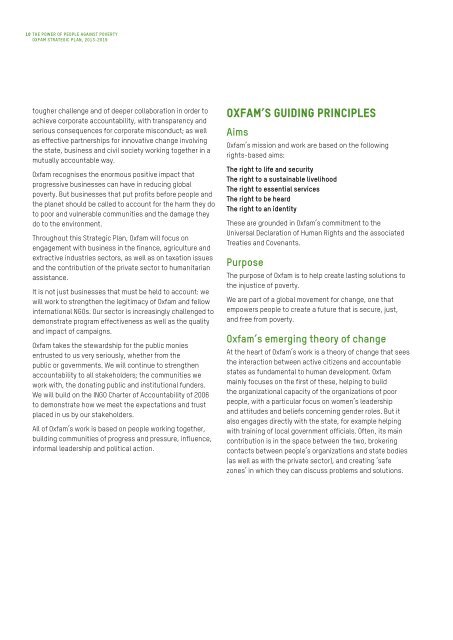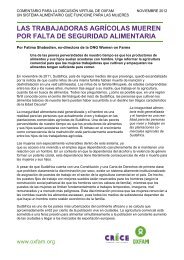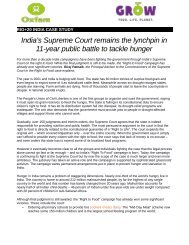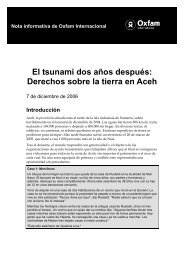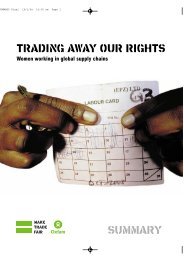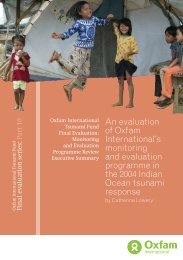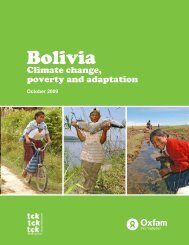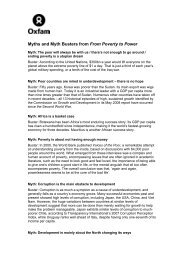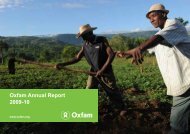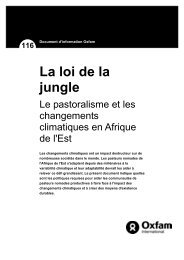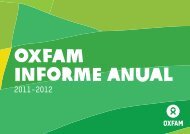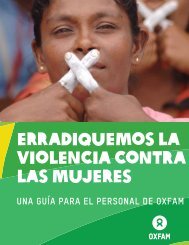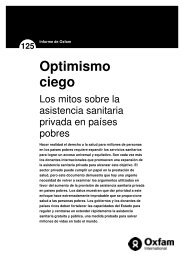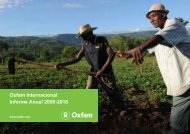Oxfam Strategic Plan, 2013-2019 - Oxfam International
Oxfam Strategic Plan, 2013-2019 - Oxfam International
Oxfam Strategic Plan, 2013-2019 - Oxfam International
Create successful ePaper yourself
Turn your PDF publications into a flip-book with our unique Google optimized e-Paper software.
10 THE POWER OF PEOPLE AGAINST POVERTY<br />
OXFAM STRATEGIC PLAN, <strong>2013</strong>-<strong>2019</strong><br />
tougher challenge and of deeper collaboration in order to<br />
achieve corporate accountability, with transparency and<br />
serious consequences for corporate misconduct; as well<br />
as effective partnerships for innovative change involving<br />
the state, business and civil society working together in a<br />
mutually accountable way.<br />
<strong>Oxfam</strong> recognises the enormous positive impact that<br />
progressive businesses can have in reducing global<br />
poverty. But businesses that put profits before people and<br />
the planet should be called to account for the harm they do<br />
to poor and vulnerable communities and the damage they<br />
do to the environment.<br />
Throughout this <strong>Strategic</strong> <strong>Plan</strong>, <strong>Oxfam</strong> will focus on<br />
engagement with business in the finance, agriculture and<br />
extractive industries sectors, as well as on taxation issues<br />
and the contribution of the private sector to humanitarian<br />
assistance.<br />
It is not just businesses that must be held to account: we<br />
will work to strengthen the legitimacy of <strong>Oxfam</strong> and fellow<br />
international NGOs. Our sector is increasingly challenged to<br />
demonstrate program effectiveness as well as the quality<br />
and impact of campaigns.<br />
<strong>Oxfam</strong> takes the stewardship for the public monies<br />
entrusted to us very seriously, whether from the<br />
public or governments. We will continue to strengthen<br />
accountability to all stakeholders; the communities we<br />
work with, the donating public and institutional funders.<br />
We will build on the INGO Charter of Accountability of 2006<br />
to demonstrate how we meet the expectations and trust<br />
placed in us by our stakeholders.<br />
All of <strong>Oxfam</strong>’s work is based on people working together,<br />
building communities of progress and pressure, influence,<br />
informal leadership and political action.<br />
OXFAM’S GUIDING PRINCIPLES<br />
Aims<br />
<strong>Oxfam</strong>’s mission and work are based on the following<br />
rights-based aims:<br />
The right to life and security<br />
The right to a sustainable livelihood<br />
The right to essential services<br />
The right to be heard<br />
The right to an identity<br />
These are grounded in <strong>Oxfam</strong>’s commitment to the<br />
Universal Declaration of Human Rights and the associated<br />
Treaties and Covenants.<br />
Purpose<br />
The purpose of <strong>Oxfam</strong> is to help create lasting solutions to<br />
the injustice of poverty.<br />
We are part of a global movement for change, one that<br />
empowers people to create a future that is secure, just,<br />
and free from poverty.<br />
<strong>Oxfam</strong>’s emerging theory of change<br />
At the heart of <strong>Oxfam</strong>’s work is a theory of change that sees<br />
the interaction between active citizens and accountable<br />
states as fundamental to human development. <strong>Oxfam</strong><br />
mainly focuses on the first of these, helping to build<br />
the organizational capacity of the organizations of poor<br />
people, with a particular focus on women’s leadership<br />
and attitudes and beliefs concerning gender roles. But it<br />
also engages directly with the state, for example helping<br />
with training of local government officials. Often, its main<br />
contribution is in the space between the two, brokering<br />
contacts between people’s organizations and state bodies<br />
(as well as with the private sector), and creating ‘safe<br />
zones’ in which they can discuss problems and solutions.


